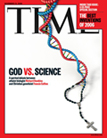 TIME magazine had an immensely stupid article called “God vs. Science” on the cover of its Nov. 13, 2006 issue. They couldn’t even decide who the combatants were in this supposed duel. Right off the bat, they confuse science with “Darwinism” and religion with “God”. Then they make the ludicrous suggestion that science might not be able to “withstand the criticisms” of Christians.
TIME magazine had an immensely stupid article called “God vs. Science” on the cover of its Nov. 13, 2006 issue. They couldn’t even decide who the combatants were in this supposed duel. Right off the bat, they confuse science with “Darwinism” and religion with “God”. Then they make the ludicrous suggestion that science might not be able to “withstand the criticisms” of Christians.
The article does make the somewhat useful point, however, that the “debate” may be becoming more polarized (as in my opinion it should), although there are also now more “informed conciliators”, by which Time apparently means people who believe in magic but have letters like PhD after their names.
Unfortunately, Time chose not to actually report further on the subject—which encompasses minor topics such as, oh, how a scientific explanation of religious belief and experience could affect the history of the world, including Islamic terrorism. Instead, it printed a painful dialog between Richard Dawkins and Francis Collins (Wikipedia), eminent genome decoder and devout Christian.
Painful because of how stupid Collins sounds. He starts off by rolling out the tired old theory about God setting the machine in motion, “activating evolution” at the moment of creation of the universe (or at least all parts of it other than Himself), but in this contorted version apparently having foreknowledge of everything including the ridiculous discussion itself. Somehow, this is supposed to reconcile God’s omniscience with free will. Of course, God didn’t want to make things too easy for us, so he hid all the clues to His existence—which is why Dawkins can’t see them! God tweaked the universal physical constants so we could exist (what were they set to before?). The existence of God satisifies Occam’s razor, since it’s such a simple explanation—God made everything! Collins accuses Dawkins of holding an “impoverished view of the kinds of questions we humans can ask, such as ‘Is there a God?’”. But if by this he means Dawkins thinks such questions are invalid, he’s just wrong. Of course Dawkins’s view is that humans can ask such questions. He simply answers them in the negative.
But wait! Collins now zigzags and says God, instead of being the Guy that sets up the model train layout and twiddles the knobs, is actually “something incredibly grand and incomprehensible and beyond our present understanding.” But if that were the case, how could we understand Him fiddling with the gravitational constant or setting evolution in motion? And then suddenly he has God not just setting things up at the beginning, but micromanaging miracles like the virgin birth, because “it was a particularly significant moment for him to do so.” Collins is also apparently ignorant of all the recent research on human ethics and altruism, continuing to flog the old notion that only God can make us ethical.
Collins concludes:
…there are answers that science isn’t able to provide about the natural world—the questions about why instead of the questions about how. I’m interested in the whys. I find many of those answers in the spiritual realm. That in no way compromises my ability to think rigorously as a scientist.
So now, finally, God is reduced to the concept of all the Unknown Stuff Out There. And it doesn’t compromise Collins’ ability to think rigorously that he believes in the resurrection (but not, of course, in the creation story in Genesis; which he says cannot be interpreted “narrowly”, was not “intended as a science textbook”, and is actually “very consistent with the Big Bang”).
Collins asserts that God provides the answer to the “why” questions, presumably of the “why are we here” variety. But he never explains what those answers are, how there could be such answers, or what the nature of those answers might be.
Collins should have followed the advice he quotes St. Augustine as giving, warning against a very narrow perspective that will put our faith at risk of looking ridiculous. If he had, he would have skipped this whole discussion. That would have let Time do what it should have in the first place, which is to actually report on the issue.

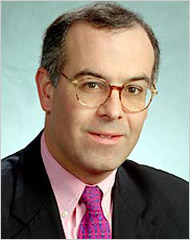 The New York Times published a last week on the topic of meta-neurotheology: the context and evolution of the social discussion about neurotheology. Author David Brooks points out the huge impact that the neuroscience revolution is having and will have on our culture’s views of God, religion, and science. His main point: the direction we will take as the discussion unfolds is not towards atheism and pure materialism, but rather something he calls neural Buddhism: “new movements that emphasize self-transcendence”, based on beliefs in a dynamic self , shared morals, elevated experience, and a new concept of God .
The New York Times published a last week on the topic of meta-neurotheology: the context and evolution of the social discussion about neurotheology. Author David Brooks points out the huge impact that the neuroscience revolution is having and will have on our culture’s views of God, religion, and science. His main point: the direction we will take as the discussion unfolds is not towards atheism and pure materialism, but rather something he calls neural Buddhism: “new movements that emphasize self-transcendence”, based on beliefs in a dynamic self , shared morals, elevated experience, and a new concept of God .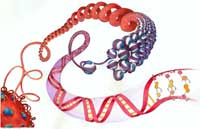 “Life’s experiences add molecular switches to the genes that control our brain activity,” is the subhead on an
“Life’s experiences add molecular switches to the genes that control our brain activity,” is the subhead on an 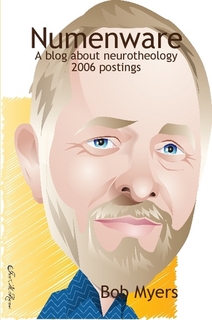 2006 postings to Numenware are now available in
2006 postings to Numenware are now available in 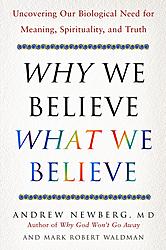 The word must be out about what Daddy’s interested in because under the tree for me at Christmas-time were two, count ’em, two books by
The word must be out about what Daddy’s interested in because under the tree for me at Christmas-time were two, count ’em, two books by  Sam Harris’ book
Sam Harris’ book 
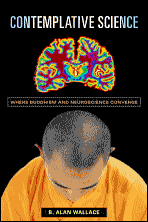
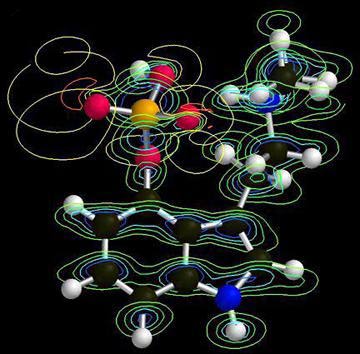 The journal
The journal